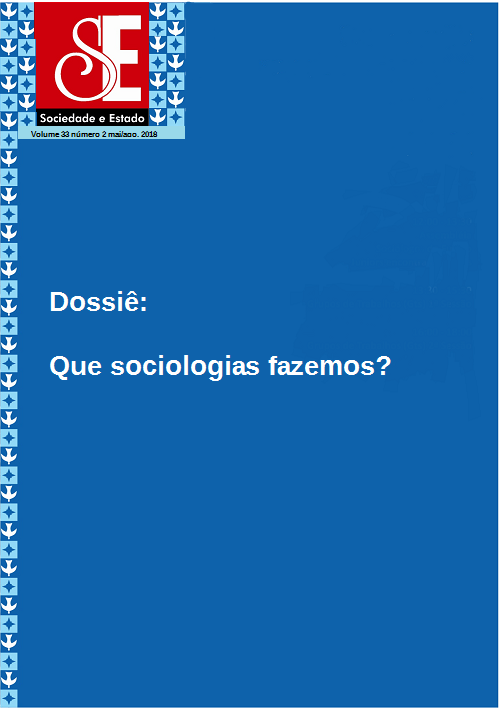Elementos-chave de uma teoria da sociedade mundial
DOI:
https://doi.org/10.1590/s0102-699220183302005Palabras clave:
Sistema mundial, Evolução sociocultural, Complexidade global, Diferenciação funcional, Mecanismos de globalizaçãoResumen
Esse artigo oferece uma visão geral dos insights necessários para se construir uma teoria da sociedade mundial. A seção 1 define o conceito de sociedade e busca identificar tipos diferentes de sociedade que podem ser observados na história dos sistemas sociais humanos; 2 conecta o argumento sobre a sequência de tipos de sociedade com uma reconstrução dos padrões de povoamento da Terra por grupos de humanos; e 3 apresenta um conceito geral de evolução sociocultural como o processo básico de formação das sociedades. O artigo então muda seu foco para a formação da sociedade mundial moderna como a forma contemporânea da sociedade (séculos XVIII ao XXI) e 4 define os principais aspectos da complexidade do sistema mundial e o nexo com a diferenciação funcional; 5 identifica as revoluções inclusivas que ocorrem desde o século XVIII como pontos de partida dos sistemas de função global como a economia, a educação, a ciência e as instituições políticas, e 6 explica a inter-relação dos sistemas de função a outras autoestruturas (Eigenstructures) emergentes da sociedade mundial (as redes globais, organizações globais, comunidades epistêmicas e sistemas de interação global); finalmente, 7 debruça-se sobre mecanismos básicos da globalização - a saber, comunicação, migração, observação e conhecimento.
Tradução: Diogo Saraiva
Descargas
Citas
AHLERS, Anna L.; STICHWEH, Rudolf. The bipolarity of democracy and authoritarianism. Value patterns, inclusion roles, and forms of internal differentiation of political systems. Bonn: FIW Working Paper 09, , 2017. Disponível em: <https://www.fiw.uni-bonn.de/publikationen/FIWWorkingPaper>.
BARABÁSI, Albert-László. Linked. How everything is connected to everything else and what it means for business, science and everyday life. New York: Plume, 2003.
BELLONE, Enrico. A world on paper. Studies on the second scientific revolution. Cambridge (MA): The MIT Press, 1980.
BLUTE, Marion. Darwinian sociocultural evolution: solutions to dilemmas in cultural and social theory. Cambridge (UK): Cambridge University Press, 2010.
BOYD, Robert; RICHERSON, Peter J. Culture and the evolutionary process. Chicago (IL): University of Chicago Press, 1985.
BRUSH, Stephen G. The history of modern science: a guide to the second scientific revolution, 1800-1950. Ames (IA): Iowa State Press, 1988.
BUCHANAN, Mark. Ubiquity: why catastrophes happen. New York: Crown, 2002.
BURT, Ronald S. Structural holes. The social structure of competition. Cambridge (MA): Harvard University Press, 1992.
CAMPBELL, Donald T. Methodology and epistemology for social science. Chicago (IL): University of Chicago Press, 1988.
---- . Natural selection as an epistemological model. In: NAROLL, Raoul; COHEN, Ronald (Eds.). A handbook of method in cultural anthropology, p. 51-85, Garden City (NY): Natural History Press, 1970.
DURKHEIM, Émile. De la division du travail social. Paris: Presses Universitaires de France, 1973 [1893].
EASLEY, David; KLEINBERG, Jon. Networks, crowds, and markets. reasoning about a highly connected world. Cambridge (UK): Cambridge University Press, 2010.
ENCYCLOPÆDIA BRITANNICA. “Society”. in Encyclopaedia Britannica, v. 3. Edinburgh: Britannica, 1771.
GOFFMAN, Erving. The interaction order. American Sociological Review, v. 48, n. 1, p. 1-17, 1983.
---- . Encounters: two studies in the sociology of interaction. Indianapolis (IN): Bobbs-Merrill, 1961.
GOLDIN, Claudia; KATZ, Lawrence F. The race between education and technology. Cambridge (MA); London: The Belknap Press of Harvard University Press, 2008.
HODGSON, Geoffrey M.; THORBJORN, Knudsen. Darwin’s conjecture. The search for general principles of social and economic evolution. Chicago (IL): University of Chicago Press, 2010.
JUDSON, Pieter M. The Habsburg Empire. A new history. Cambridge (MA): The Belknap Press of Harvard University Press, 2016
KÖPPING, Klaus Peter. Adolf Bastian and the psychic unity of mankind. the foundations of anthropology in nineteenth century germany. Münster: Verlag, 2005.
LUHMANN, Niklas. Einfache Sozialsysteme. In: LUHMANN, Niklas (Ed.). Soziologische Aufklärung 2, p. 21-38. Opladen: Westdeutscher Verlag, 1975.
MADDISON, Angus. Growth and interaction in the world economy. the roots of modernity. Washington (DC): The AEI Press, 2005.
MAYR, Ernst. Systematics and the origin of species from the viewpoint of a zoologist. Cambridge (MA): Harvard University Press, 1999 [1942].
MORGNER, Christian. The evolution of the art fair. Historical Social Research/Historische Sozialforschung, v. 39, n. 3, p. 318-336, 2014.
NELSON, Richard R.; WINTER, Sidney G. An evolutionary theory of economic change. Cambridge (MA): The Belknap Press of Harvard University Press, 1982.
NORTH, Douglas C.; THOMAS, Robert Paul. The rise of the Western World: a new economic history. New York: Cambridge University Press, 1973.
OLDS, Linda E. Metaphors of interrelatedness: towards a systems theory of psychology. New York: State Universioty of New York Press, 1992.
PARSONS, Talcott; PLATT, Gerald M. The american university. Cambridge (MA): Harvard University Press, 1974.
RICHERSON, Peter J.; BOYD, Robert. Not by genes alone. How culture transformed human evolution. Chicago: University of Chicago Press, 2005.
STICHWEH, Rudolf. Inklusion und Exklusion. Studien zur Gesellschaftstheorie (2. erweiterte Auflage). Bielefeld (DE): Transcript, 2016.
---- . Wissensordnungen und Wissensproduktion im 21. Jahrhundert. Merkur, v. 68, n. 4, p. 336-344, 2014.
---- . Zur Soziologie des Weltereignisses. In: NACKE, Stefan; UNKELBACH, René; WELTEREIGNISSE, Tobias Werron (Eds.). Theoretische und empirische Perspektiven, p. 17-40. Wiesbaden (DE): VS Verlag für Sozialwissenschaften, 2008.
---- . The Eigenstructures of world society and the regional cultures of the world. In: ROSSI, Ino (Ed.). Frontiers of globalization research: theoretical and methodological approaches, p. 133-49. New York: Springer, 2007a.
---- . Evolutionary theory and the theory of world society. Soziale Systeme, v. 13 p. 528-542, 2007b.
---- . Zum Gesellschaftsbegriff der Systemtheorie: Parsons und Luhmann und die Hypothese der Weltgesellschaft. In: HEINTZ, Bettina; MÜNCH, Richard; TYRELL, Hartmann (Eds.). Weltgesellschaft. Theoretische Zugänge und empirische Problemlagen, p. 174-185. Stuttgart (DE): Lucius & Lucius, 2005.
---- . The sociology of scientific disciplines: on the genesis and stability of the disciplinary structure of modern sciene. Science in Context, v. 5, p. 3-15, 1992.
---- . Zur Entstehung des modernen Systems wissenschaftlicher Disziplinen. Physik in Deutschland 1740-1890. Frankfurt (DE): Suhrkamp, 1984.
SUBRAHMANYAM, Sanjay. Explorations in connected history. Mughals and Franks. New Delhi: Oxford University Press, 2005.
VAN DIJCK, José. The culture of connectivity. a critical history of social media. Oxford (UK): Oxford University Press, 2013.











